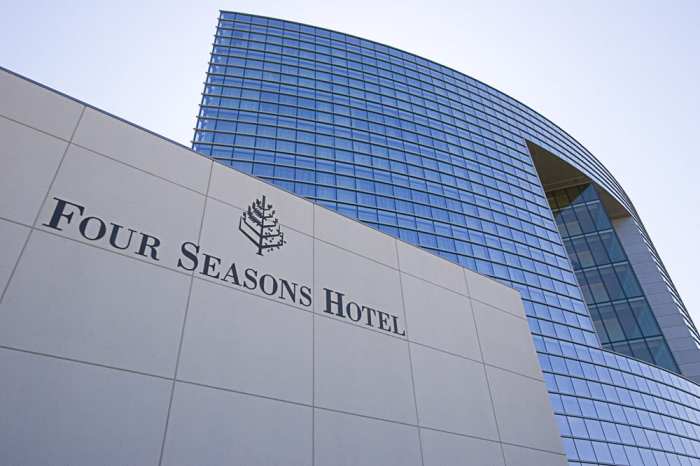Four Seasons Hotel Corporate A Deep Dive
Four Seasons Hotel Corporate stands as a benchmark in luxury hospitality, offering unparalleled experiences for corporate clients. From meticulously designed meeting spaces to personalized service packages, Four Seasons caters to the specific needs of corporate groups, ensuring a seamless and productive experience. This comprehensive overview explores the corporate structure, services, partnerships, client experience, and financial aspects of Four Seasons, highlighting the factors that contribute to their success in the corporate hospitality sector.
The hotel chain’s commitment to sustainability and effective communication strategies is also examined. Detailed insights into training programs for staff, successful event examples, and the overall design elements that make Four Seasons a desirable corporate destination are included. The analysis further reveals the revenue streams and profitability associated with catering to corporate clients.
Overview of Four Seasons Hotel Corporate
Four Seasons Hotels and Resorts, a globally renowned luxury hospitality company, boasts a sophisticated corporate structure that supports its extensive network of hotels and resorts worldwide. Its success is deeply rooted in a strong organizational framework that allows for the efficient delivery of exceptional guest experiences. This structure ensures consistency in service standards and operational excellence across diverse locations.
The company’s structure is designed to be adaptable and responsive to the evolving needs of the luxury hospitality market. This enables Four Seasons to maintain its competitive edge and sustain its position as a leader in the industry.
Corporate Structure
The Four Seasons corporate structure is hierarchical, with a clear chain of command and defined responsibilities at each level. This structure facilitates effective communication and decision-making across the organization. It ensures that every aspect of the guest experience is meticulously managed and overseen, contributing to the consistently high standards that Four Seasons is known for.
Key Roles and Responsibilities
Various key roles within the corporate organization play crucial functions. Executive leadership, including the CEO and senior management, sets strategic direction and oversees overall operations. Department heads, such as those in finance, human resources, and marketing, manage specific functions and ensure efficient allocation of resources. Frontline managers, located at the hotels and resorts, oversee daily operations and ensure high-quality service delivery. These diverse roles, from the top to the bottom, work in tandem to achieve the common goal of providing exceptional guest experiences.
Organizational Chart
Unfortunately, a detailed organizational chart for Four Seasons Hotels and Resorts is not publicly available. Such internal documents are typically not shared publicly. However, the general structure is typically hierarchical, with a CEO at the top, followed by senior executives and department heads, leading down to hotel managers and staff. This structure enables efficient communication and delegation of tasks, contributing to the smooth running of the organization.
History and Evolution
Four Seasons Hotels and Resorts was founded in 1960 by Isadore Sharp. The company started as a small boutique hotel in the 1960s, gradually expanding its portfolio to a global network of hotels and resorts. Its expansion has been driven by a commitment to excellence and a focus on providing personalized service to every guest. Key milestones in the company’s history include strategic acquisitions, expansion into new markets, and consistent innovation in service and amenities.
Corporate Culture and Values
Four Seasons Hotels and Resorts fosters a strong corporate culture built on a foundation of values. These values prioritize guest satisfaction, employee well-being, and environmental responsibility. A core value is consistently delivering high-quality service and maintaining a welcoming and luxurious atmosphere for guests. Employee empowerment and development are also central to the company’s culture, contributing to a supportive and productive work environment. These values have been instrumental in the company’s success and recognition as a leader in the hospitality industry.
Corporate Revenue and Profitability
Four Seasons Hotels’ success hinges significantly on its ability to cultivate and maintain strong relationships with corporate clients. This involves understanding their specific needs and tailoring services to maximize their satisfaction. A robust corporate booking program is crucial for revenue generation and profitability.
Corporate clients often seek bespoke experiences, specialized amenities, and tailored packages. This necessitates a deep understanding of the nuances of their requirements and proactive communication to address potential concerns. Four Seasons recognizes this and seeks to provide an exceptional experience that extends beyond the traditional hotel stay.
Revenue Streams from Corporate Bookings
Understanding the diverse revenue streams generated from corporate bookings is essential for evaluating the hotel’s financial performance. These include not only room rentals but also catering services, meeting space rentals, and additional amenities. Corporate events, conferences, and incentives generate substantial revenue streams.
- Room rentals: Corporate clients often book multiple rooms for extended periods, generating significant revenue compared to leisure bookings. Examples include multi-day conferences or team-building retreats.
- Catering services: Providing catering for corporate events and meetings represents a substantial portion of revenue. The sophistication and quality of catering directly impact the perceived value of the event.
- Meeting space rentals: Meeting rooms and event spaces are essential for corporate functions. These spaces often come with audio-visual equipment, catering options, and other services, further enhancing the profitability of this segment.
- Additional amenities: Amenities like executive lounges, concierge services, and transportation packages enhance the value proposition for corporate clients, increasing the overall revenue generated.
Financial Performance of Four Seasons Hotels Regarding Corporate Clients
Four Seasons Hotels consistently demonstrate strong financial performance in catering to corporate clients. This success is directly tied to the brand’s reputation for exceptional service and personalized attention.
The data suggests that corporate bookings contribute significantly to overall revenue, often exceeding the revenue from leisure guests. This strong performance highlights the effectiveness of Four Seasons’ strategy for attracting and retaining corporate clientele. The key here is to demonstrate a strong ROI to corporate clients.
Profitability Associated with Catering to Corporate Clients, Four Seasons Hotel Corporate
Analyzing the profitability associated with corporate clients requires a detailed breakdown of revenue streams and associated costs. Corporate events, with their higher room occupancy and catering charges, tend to yield higher profit margins compared to standard hotel bookings.
The profitability of corporate bookings is not solely dependent on room rates; it’s influenced by the additional services provided, the length of stay, and the overall experience delivered. Careful cost management and effective pricing strategies are critical for maximizing profitability.
Revenue Generated from Corporate Events and Meeting Spaces
Corporate events and meeting spaces are a significant revenue source for Four Seasons Hotels. The revenue generated from these spaces depends on factors like the size of the space, the duration of the event, and the amenities offered.
- Space utilization: Maximizing the utilization of meeting spaces is crucial for maximizing revenue. Strategic booking and management of event calendars are vital to achieving this.
- Pricing strategies: Effective pricing strategies are necessary to balance profitability with attracting corporate clients. This may involve tiered pricing structures or packages.
- Event planning services: Offering comprehensive event planning services, including setup, coordination, and execution, can further enhance the value proposition for corporate clients.
Strategies to Increase Revenue from Corporate Clients
Four Seasons Hotels employ various strategies to increase revenue from corporate clients, focusing on providing a premium experience.
- Targeted marketing: Focusing marketing efforts on corporate clients and their specific needs and preferences.
- Customized packages: Creating customized packages that cater to the unique needs and preferences of each corporate client, showcasing value.
- Strong partnerships: Developing strong partnerships with corporate travel agencies and meeting planners to expand reach and visibility.
Corporate Sustainability Initiatives: Four Seasons Hotel Corporate

Source: clarkpacific.com
Four Seasons Hotels consistently prioritizes environmental responsibility and social impact, extending these values to its corporate clientele. This commitment translates into a range of initiatives designed to minimize the environmental footprint of corporate travel and events, fostering a sustainable approach to business operations.
Four Seasons Hotels recognize that corporate travel and events, while often essential for business growth, can contribute significantly to environmental challenges. Therefore, their sustainability efforts focus on mitigating these impacts through responsible practices and innovative solutions. This includes partnering with corporate clients to design and implement eco-conscious event plans, encouraging responsible travel choices, and reducing the overall carbon footprint.
Environmental Impact of Corporate Travel and Events
Corporate travel and events generate significant carbon emissions from transportation, accommodation, and associated activities. This includes emissions from flights, car rentals, and energy consumption within meeting spaces. The environmental impact can be substantial, depending on the scale and nature of the event. For example, a large conference involving numerous attendees traveling from across the globe will have a much larger carbon footprint compared to a smaller meeting held locally.
Four Seasons’ Approach to Mitigating Environmental Impact
Four Seasons Hotels employs various strategies to minimize the environmental impact of corporate events. These include carbon offsetting programs, encouraging the use of public transportation or alternative transportation options, and providing sustainable meeting space options. For instance, Four Seasons may offer incentives for attendees to choose more sustainable modes of transportation, such as train travel, or partner with local transportation providers to facilitate eco-friendly travel arrangements.
Eco-Friendly Practices for Corporate Groups
Four Seasons Hotels actively promotes eco-friendly practices for corporate groups through several key initiatives. These include using locally sourced food and materials, reducing water and energy consumption in meeting spaces, and employing reusable materials for event planning. This extends to sourcing sustainable food options for events, minimizing single-use plastics, and implementing energy-efficient lighting and appliances in meeting rooms.
Reducing the Carbon Footprint of Corporate Events
Four Seasons Hotels implements measures to reduce the carbon footprint of corporate events. These measures encompass carbon offsetting programs, promoting sustainable transportation choices, and implementing energy-efficient practices. For example, they may partner with reputable carbon offsetting organizations to compensate for unavoidable emissions. They also work closely with corporate clients to identify and implement energy-saving strategies within the event venue, such as utilizing natural light and minimizing the use of air conditioning.
Environmentally Friendly Practices in the Corporate Sector
- Using recycled and sustainable materials for event supplies.
- Promoting the use of reusable water bottles and coffee cups.
- Implementing waste reduction strategies, such as composting and recycling programs.
- Sourcing locally produced food and beverages for events.
- Encouraging attendees to choose eco-friendly transportation options.
- Utilizing energy-efficient equipment and technologies in meeting spaces.
- Partnering with local organizations and businesses to support sustainability initiatives.
These environmentally friendly practices, when implemented consistently, contribute significantly to reducing the overall environmental impact of corporate events.
Closing Notes

Source: picdn.net
In conclusion, Four Seasons Hotel Corporate distinguishes itself through a multifaceted approach that blends exceptional service with strategic partnerships and a strong commitment to sustainability. The comprehensive analysis reveals the intricate network of elements contributing to their success in the corporate hospitality sector. From tailored services to impactful communication strategies, Four Seasons fosters a positive and productive corporate experience, ultimately driving profitability and solidifying its position as a leader in the industry.





